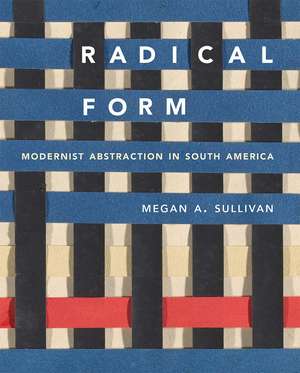Radical Form: Modernist Abstraction in South America
Autor Megan A. Sullivanen Limba Engleză Hardback – 23 aug 2022
“Sullivan’s close reading, contextual sensitivity and sidestepping of grand simplifying narratives make this book an extremely valuable addition to the growing literature on art from regions outside the classic mainstream.”—Gabriel Pérez-Barreiro, Art Newspaper
Emphasizing the open-ended and self-critical nature of the projects of abstraction in South America from the 1930s through the mid-1960s, this important new volume focuses on the artistic practices of Joaquín Torres-García, Tomás Maldonado, Alejandro Otero, and Lygia Clark. Megan A. Sullivan positions the adoption of modernist abstraction by South American artists as part of a larger critique of the economic and social transformations caused by Latin America’s state-led programs of rapid industrialization.
Sullivan thoughtfully explores the diverse ways this skepticism of modernization and social and political change was expressed. Ultimately, the book makes it clear that abstraction in South America was understood not as an artistic style to be followed but as a means to imagine a universalist mode of art, a catalyst for individual and collective agency, and a way to express a vision of a better future for South American society.
Preț: 393.08 lei
Nou
Puncte Express: 590
Preț estimativ în valută:
75.24€ • 81.75$ • 63.24£
75.24€ • 81.75$ • 63.24£
Carte disponibilă
Livrare economică 31 martie-14 aprilie
Livrare express 15-21 martie pentru 55.32 lei
Preluare comenzi: 021 569.72.76
Specificații
ISBN-13: 9780300254020
ISBN-10: 0300254024
Pagini: 232
Ilustrații: 76 color + 17 b-w illus.
Dimensiuni: 203 x 254 x 15 mm
Greutate: 1.04 kg
Editura: Yale University Press
Colecția Yale University Press
ISBN-10: 0300254024
Pagini: 232
Ilustrații: 76 color + 17 b-w illus.
Dimensiuni: 203 x 254 x 15 mm
Greutate: 1.04 kg
Editura: Yale University Press
Colecția Yale University Press
Recenzii
“Sullivan’s close reading, contextual sensitivity and sidestepping of grand simplifying narratives make this book an extremely valuable addition to the growing literature on art from regions outside the classic mainstream.”—Gabriel Pérez-Barreiro, Art Newspaper
“With careful detail and visual analysis . . . Sullivan moves meticulously through the artistic evolution of her four case studies: Uruguayan Joaquín Torres-García, Argentinean Tomás Maldonado, Venezuelan Alejandro Otero, and Brazilian Lygia Clark.”—Mariola V. Alvarez, Latin American and Latinx Visual Culture
“Beautifully constructed and convincingly argued, this book fills an important gap in published literature and will have a great impact on how scholars and students study Latin American modernism.”—Harper Montgomery, author of The Mobility of Modernism: Art and Criticism in 1920s Latin America
“Radical Form is original and certainly very intelligent. It makes an important contribution to the field of Latin American art history.”—Abigail McEwen, author of Revolutionary Horizons: Art and Polemics in 1950s Cuba
“With careful detail and visual analysis . . . Sullivan moves meticulously through the artistic evolution of her four case studies: Uruguayan Joaquín Torres-García, Argentinean Tomás Maldonado, Venezuelan Alejandro Otero, and Brazilian Lygia Clark.”—Mariola V. Alvarez, Latin American and Latinx Visual Culture
“Beautifully constructed and convincingly argued, this book fills an important gap in published literature and will have a great impact on how scholars and students study Latin American modernism.”—Harper Montgomery, author of The Mobility of Modernism: Art and Criticism in 1920s Latin America
“Radical Form is original and certainly very intelligent. It makes an important contribution to the field of Latin American art history.”—Abigail McEwen, author of Revolutionary Horizons: Art and Polemics in 1950s Cuba
Notă biografică
Megan A. Sullivan is assistant professor in the Department of Art History and the College at the University of Chicago.
Descriere
A timely look into how abstract art in South America aimed to envision a better society
